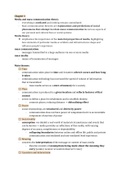Chapter 1
Media and mass communication theory
- everything is mediated and nothing remains unmediated
- Mass communication theories are explanations and predictions of social
phenomena that attempt to relate mass communication to various aspects of
our personal and cultural lives or social systems
Media theory
❖ emphasizes the importance of the material properties of media, highlighting
how elements of particular media as artifacts and infrastructures shape and
influence people’s experience
mass communication:
- messages transmitted to a large audience via one or more media
mass media:
- means of transmission of messages
Main themes:
Time
- communication takes place in time and it matters when it occurs and how long
it takes
- communication technology has increased the speed of volume of information
that is transmitted
- mass media serves as a store of memory for a society
Place
- communication is produced in a given location and reflects features of that
context
- serves to define a place for inhabitants and to establish identity
- connects places, reducing distance -> delocalizing effect
Power
- social relationships are structured and driven by power
- communication does not have power of compulsion but it is an invariable
component of exercise of power
Social reality
- assumption: we inhabit a real world of material circumstances and events that
can be known -> media provides us reflections of this reality, with varying
degrees of accuracy, completeness or dependability
- collapsing boundaries between online and offline life, public and private
communication and mediated and non-mediated lived experience.
Meaning
- concerns the interpretation of the message or content of mass media
- theories consists of assumptions being made about the meaning they
carry (sender, receiver or neutral observer’s view)
Causation and determinism
,- theories try to solve questions of cause and effect -> by proposing overall
explanations that links observations or by directing inquiry to determine
whether one factor caused another
- arise to the consequences of media messages on individuals
- arise in relation to historical questions of rise of media institutions
Mediation
- alternative to cause and effect -> consider the media to provide occasions,
links, channels, arenas, and platforms for information and ideas to
circulate
- by way of the media, meanings are formed and social and cultural forces operate
freely according to logics and with no predictable outcome
- mediation influences the meaning received and there is a tendency for
reality to be adapted to the demands of media presentation
Identity
- self-identity (individual sense of wholeness) and social identity (shared sense of
belonging to a group)
- media is associated with aspects of self and social identity formation,
maintenance and dissolution
- they drive and reflect social change to lead to more or less integration
Cultural difference
- mass communication and media institutions are affected by differences in
culture at the level of individual, subgroup, nation
- production and use of mass media are cultural practices that reinforce
and resist the universalizing tendencies of the technologies involved,
and of much mass-produced content.
Governance
- various media are regulated and controlled by laws, rules, customs and codes,
as well as by market management
- continuous evolution in response to changes in technology and society
❖ Issues dealt in communication:
➢ relations with politics and state
■ campaigns, propaganda, citizen participation and democracy
■ media role in war and terrorism
■ serving or resisting sources of power
➢ cultural issues
■ globalization of content and flow
■ promoting quality of cultural life and cultural production
■ effects on cultural and social identity
➢ social concerns
■ definition of reality and mediation
■ links to aggression, crime and violence, social order and disorder
, ➢ normative questions
■ freedom of speech and expression, social and cultural inequality
■ media norms, ethics, professionalism, accountability
■ social responsibility
➢ economic concerns
■ commercialization of content, privacy and surveillance capitalism
■ global imperialism and dependency
Limitations of coverage and perspective
● the nature of the relation between media and society depends on
circumstances of time and place
● mass-media are experienced differently in societies with non-western
characteristics, especially those that are less individualistic and more
communical in character or less secular and more religious
○ differences involve differences of culture and long historical
experience
● media and mass communication cannot provide theoretically neutral,
scientifically verified information about effects or the significance of something
that is an immensely complex as well as intersubjective set of processes
○ it is difficult to formulate theories that are open to empirical testing or
that escape the conclusion that contextual, situational and environmental
aspects have greater explanatory value than broad theories of media
influence and effects
● the study of media and mass communication is fundamentally powerful and
adaptive -> it is also characterized by widely divergent perspectives
○ progressive and conservative tendencies (political axis):
■ progressive theory
● critical of power exercised by media in the hands of a
dominant class in society
■ conservative theory
● point liberal bias of the news or damage done to traditional
values by the media, and the perceived power of media to
corrupt minds, attitudes and behaviors.
○ critical and administrative orientation (more applied approach to theory)
(no political axis necessarily):
■ critical theory
● seeks to expose underlying problems and faults of media
practice and to relate them in a comprehensive way to
social issues, guided by certain values
■ applied theory
● aims to harness an understanding of communication
processes to solving practical problems of using media and
mass communication more effectively





